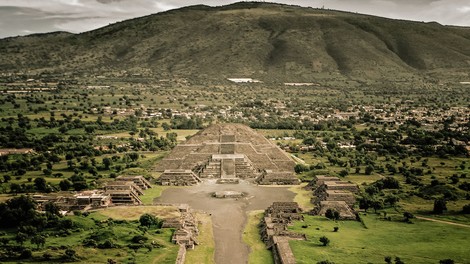Your podcast discovery platform
Curious minds select the most fascinating podcasts from around the world. Discover hand-piqd audio recommendations on your favorite topics.

piqer for: Globalization and politics Global finds
Luis BARRUETO is a journalist from Guatemala. Studied business and finance journalism at Aarhus University in Denmark and City University London.
It Wasn't Just Greece: Archaeologists Find Early Democratic Societies In The Americas
Decades ago, premodern republics such as classical Athens were thought to be a purely European phenomenon. But anthropologists have in recent years identified several cases of more democratic societies in Mesoamerica, the region in the Americas within which pre-Columbian societies like the Maya and Aztec civilizations flourished before the arrival of Europeans.
Places like Monte Albán, the capital of the Zapotec people in Oaxaca between 500 B.C.E. and 800 C.E., was not organized around an individual autocrat who controlled resources, the military, and trade, as common in Maya and Olmec societies. Instead, Monte Alban's signs of authority were more linked to cosmology than to individual rulers, and architecture was devoid of palaces and ostentatious representations of despots.
Pre-Columbian city-state Tlaxcallan also points to the existence of "collective" systems of political organization in premodern Mesoamerica: the city had a market-based economy, which created taxpayers rich enough to fund the state and its provision of public goods. As Purdue University's Richard Blanton argues, the city maintained its autonomy from Aztec domination by implementing a "highly collective political strategy" that ensured citizens across social sectors could take part in governance, reorganized regional settlement patterns, and offered basic public goods. The Tlaxcallans also constructed a disembedded capital, that is, one where political and decision-making activities are set aside from society's mainstream commercial and socioeconomic functions, creating a first glimpse of a division between the administrative state and the trade and military activities.
While many of us think of Greece as democracy's sole cradle, Lizzie Wade's piece in Science Magazine describes several alternative examples in Mesoamerica. While they were not fully democratic in the modern sense, they point to Greece as not being a single-shot phenomenon in human history.

thanks for piq-ing! the teaser text is strikingly similar to one chapter in b. traven's novel 'gobierno' ('regierung') - first part of the 'caoba cylcle', and published in the 1930s - in which he describes the traditional rites performed during the election of a new chief among some indigenous mexican communities. living in mexico for decades traven must have picked it up from natives. apparently it wasn't lost completely but part of the oral tradition of the native mexicans (or were the archaeologists maybe inspired by traven's novel when interpreting their findings?)